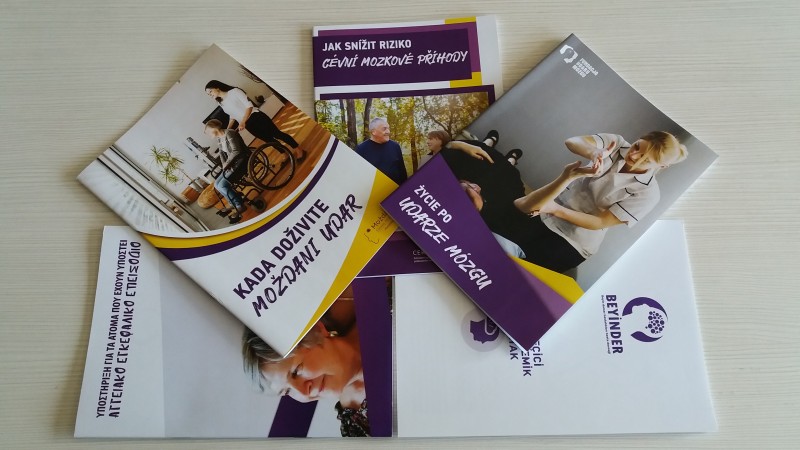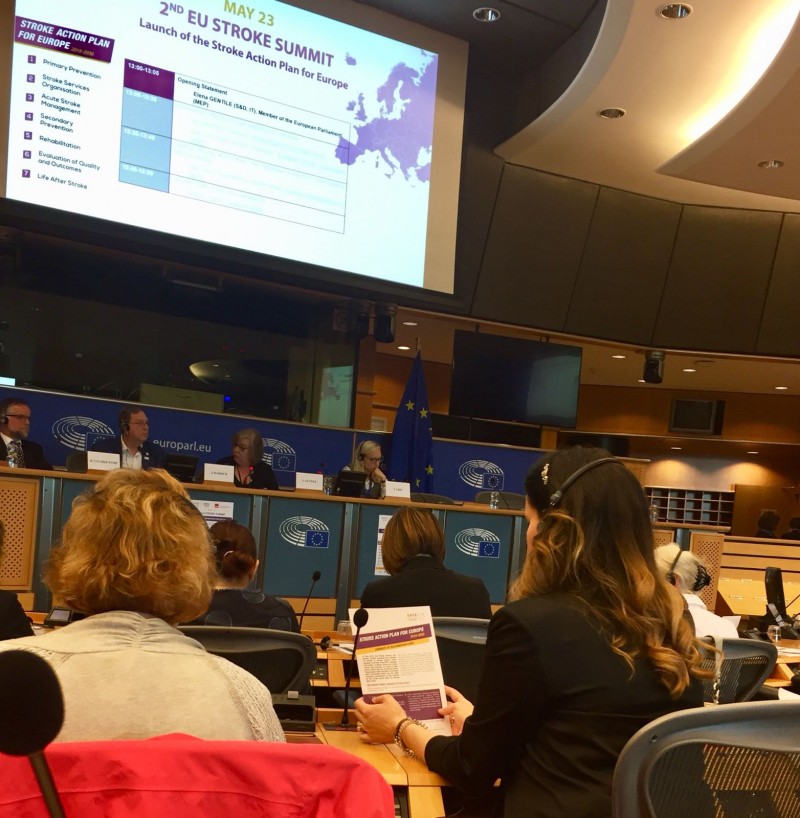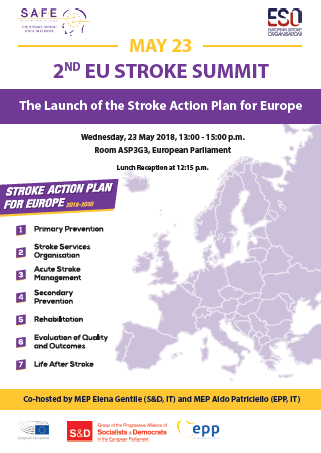
May 30, 2018
SAFE is proud to be part of the Angels Initiative project, providing critical information to stroke patients when they most need it, already in the stroke unit. The realisation of this project started simultaneously this May in 12 European countries: Spain, Serbia, Poland, Czech Republic, Latvia, Croatia, Macedonia, Greece, Ukraine, Georgia, Hungary and Turkey. (more…)

May 28, 2018
The text first appeared on the World Stroke Organisation blog
The World Stroke Organization leadership team and stroke survivors drawn from our membership network are in Geneva this week. They are contributing to critical health policy discussions taking place in and around the 71st World Health Assembly. In a packed programme they will be participating in sessions; contributing to partnership side-events; meeting with WHO technical leads and collaborating with our advocacy colleagues in the Non-Communicable Disease (NCD) arena to improve stroke prevention and equitable access to quality clinical care. (more…)

May 23, 2018
 The Stroke Action Plan for Europe 2018-2030 was launched today in the EU Parliament within the 2nd Stroke Summit.
The Stroke Action Plan for Europe 2018-2030 was launched today in the EU Parliament within the 2nd Stroke Summit.
Last year, in May 2017, SAFE launched the Burden of Stroke Report which unveiled shocking disparities between and within European countries along the entire stroke care pathway. In order to take action, SAFE and the European Stroke Organisation (ESO) decided to formalise their partnership which has led, after extensive consultation and tireless work, to the creation of the Stroke Action Plan for Europe 2018-2030.
This document sets important targets covering seven key pillars, from primary prevention to life after stroke. The report was launched today at the 2nd Stroke Summit in the European Parliament in front of around 70 key stakeholders including patients, healthcare professionals and policy-makers. The event was co-hosted by MEP Elena Gentile (S&D, IT), who showed her support to stroke survivors and stroke-related issues across Europe.
All the speakers welcomed the Stroke Action Plan and saluted the effort made by SAFE and ESO in making the Stroke Action Plan for Europe possible. It provides a clear road map and outlines recommendations and targets for 2030 so that all relevant stakeholders take action to improve the stroke care pathway and reverse the current trends.
Currently, an increase of 34% in the absolute number of strokes is expected by 2035 in Europe, along with a 45% increase in the number of stroke deaths, and a 25% increase in the number of survivors living with the long-lasting effects of stroke. Action needs to be taken to prevent stroke more efficiently, provide timely and adequate treatment and rehabilitation to those who need it, and last but not the least, to improve the lives of stroke survivors and their families across Europe by providing the right level of support in their Life After Stroke. (more…)

May 17, 2018
Building on the preceding Helsingborg Declarations of 1995 and 2006, the European Stroke Action Plan was launched today at ESOC 2018. It creates an aspirational framework to drive healthcare policy, research priorities, local stroke management and patient-focused care to meet the need demonstrated in the ESO/SAFE Burden of Stroke report, with €45 billion direct and indirect healthcare costs each year, a 34% increase in strokes by the year 2035 due to the ageing population, and huge variations in the level of stroke care available across Europe.
Stroke Action Plan Chair, Prof Bo Norrving, said: “Resources for stroke do not match the societal impact and burden of the condition. ESO has joined forces with SAFE to define the priorities for stroke care and research across Europe over the next decade.”
(more…)

May 16, 2018
WAKE-UP has provided a new treatment option for stroke patients if it is not known when their stroke started.
Up to 20 per cent of stroke patients wake up in the morning with stroke symptoms. This means that the time when their stroke started is unknown and so they are not routinely eligible for clot-busting treatment (thrombolysis) with drugs such as as alteplase, which is only approved to be used within 4.5 hours after the start of stroke symptoms. Every year about two million patients have a stroke in the EU, including approximately 400.000 patients with ‘wake-up- stroke’ or who otherwise have unknown time of symptom onset.
Now, the WAKE-UP study has revealed for the first time that selecting patients for treatment based on what is shown in their MRI brain images can be used to decide if they get thrombolysis. By comparing different images from the MRI examination, clinicians can now deduce when a stroke is likely to have started, and whether a patient is likely to benefit from thrombolysis. (more…)

May 14, 2018
Posted on Friday May 11, 2018 by The Foundry Healthcare
I am a child of immigration. Both my parents came to the UK for their education, and because of this the value and importance of education has been a strong influence in my life. I believe that education can equalise the playing field, it can transform the potential of anyone and can create real change. To me the Stroke Support Organisation Faculty Tool, SSOFT, incorporates these important aspects; equal access, increased potential and the means to change things for the better. (more…)




 The Stroke Action Plan for Europe 2018-2030 was launched today in the EU Parliament within the 2nd Stroke Summit.
The Stroke Action Plan for Europe 2018-2030 was launched today in the EU Parliament within the 2nd Stroke Summit.




